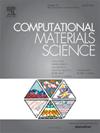机器学习在储能聚合物基电介质中的研究进展
IF 3.3
3区 材料科学
Q2 MATERIALS SCIENCE, MULTIDISCIPLINARY
引用次数: 0
摘要
在先进分析学与人工智能相结合的现代科学研究新形势下,机器学习(ML)在储能电介质中的应用已成为该领域的研究热点。本文综述了机器学习在储能聚合物基电介质研究中的重要作用,重点介绍了机器学习在储能聚合物基电介质研究中的重要作用,重点是实现快速性能预测和加速新材料的研究和开发。内容重点介绍了几种常用的建立数据库的方法和代表性算法,包括数据集收集结果、模型计算结果和实验验证结果。并对各种数据集收集方法的优缺点以及各种算法预测应用的准确性和可靠性进行了总结和比较。最后,基于机器学习对储能聚合物研究领域的影响,讨论了其发展前景和面临的挑战。本文综述了现有研究人员在将ML应用于储能聚合物方面的最新进展,并期望为利用ML制备高能存储聚合物基介电材料提供新的模式。本文章由计算机程序翻译,如有差异,请以英文原文为准。

Machine learning research advances in energy storage polymer-based dielectrics
In the new circumstances of modern scientific research combining advanced analytics and artificial intelligence, the application of machine learning (ML) to energy storage dielectrics has become the focus of research attention in this field. In this review, the current disciplinary fields and basic workflow of ML applications are summarized and the important impact of ML in energy storage polymer-based dielectric research is emphasized, with a focus on enabling rapid performance prediction and accelerating the research and development of novel materials. The content focuses on several common methods and representative algorithms for establishing databases, including dataset collection results, model calculation results, and experimental verification results. Moreover, the advantages and disadvantages of each method of dataset collection and the accuracy and reliability of each algorithm prediction application are summarized and compared. Finally, based on ML’s impact on the research field of energy storage polymer, its prospects and challenges are discussed. This review not only provides the latest progress of existing researchers in using ML in energy storage polymers but also looks forward to providing new modes for the preparation of high-energy storage polymer-based dielectrics through ML.
求助全文
通过发布文献求助,成功后即可免费获取论文全文。
去求助
来源期刊

Computational Materials Science
工程技术-材料科学:综合
CiteScore
6.50
自引率
6.10%
发文量
665
审稿时长
26 days
期刊介绍:
The goal of Computational Materials Science is to report on results that provide new or unique insights into, or significantly expand our understanding of, the properties of materials or phenomena associated with their design, synthesis, processing, characterization, and utilization. To be relevant to the journal, the results should be applied or applicable to specific material systems that are discussed within the submission.
 求助内容:
求助内容: 应助结果提醒方式:
应助结果提醒方式:


